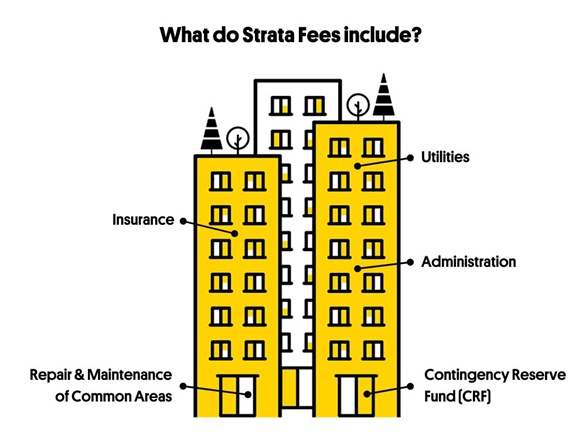
Strata Fees: A Complete Guide for Owners and Council Members
In this installment of our Strata 101 Series, we delve deep into the topic of Strata Fees. We will explore what they are, how we calculate them, and why they are important to your community. If you’re unsure how this guide can help you, consider the following scenario:
You are considering one of the largest purchases of your life, a condo, and your Realtor sends over the e-mail containing all the strata documents to review. Included in the swath of attachments is the Strata Maintenance Fee schedule. The figures listed give you pause, and you ask yourself "Are these fees too high or is this normal?”
Or perhaps you've joined your Council:
Another Strata Council meeting, and another round of discussions about the upcoming budget and the fees needed to support it. You’ve worked hard as a Council to prepare a balanced budget, but fees will need to increase. You understand the Owners’ concerns about rising strata maintenance fees, you’re an Owner after all, but you also know how important it is to plan for the future. At the upcoming AGM, you will need to highlight this importance and ease their concerns.
Our Strata 101 series aims to help you develop a deeper understanding of the governance of your community, regardless of whether or not you choose to volunteer on your Strata Council. With this enhanced knowledge, you will have the ability to actively participate in the discussions and decisions that impact your community and ultimately your investment.
Share this Resource with a Neighbour!
Table of Contents
What are Strata Fees?
First, let’s start with the basics! Strata Fees, also known as Strata Maintenance Fees, represent your share of the budgeted funds that your Strata Corporation requires to cover the community's common expenses.
Each year, the Strata Council prepares a budget which Owners vote on at the Annual General Meeting (AGM). A majority of Owners need to approve the budget (and the Strata Fees that fund it) at the meeting for it to pass.
As an Owner, attending your AGM is not only a chance to vote on your Strata Fees, but a great opportunity to learn more about what is happening in your Community and meet fellow Residents. If you're on Council currently or considering volunteering at your next AGM, you can brush up on different roles, by reading our Strata Council – The Guide to Success.
Strata Corporations are “not-for-profit" legal entities. At the end of the budget year, the goal is to “break-even”. This means the strata maintenance fees collected will be equal to the estimated expenses for the Strata Corporation.
How are Strata Fees calculated?
Generally, strata fees are calculated by dividing the approved budget expenses among all units based on the unit entitlement. The square footage of the strata lot's "habitable area" commonly determines the unit entitlement for residential strata lots. When calculating unit entitlement, balconies and patios do not count as habitable areas.
The strata fee schedule that accompanies your budget typically includes your unit entitlement. Additionally, you can find it on the strata plan for your community.  For bare land strata lots, you will likely find that the unit entitlement is the same for all lots within the Strata Corporation.
For bare land strata lots, you will likely find that the unit entitlement is the same for all lots within the Strata Corporation.
The Strata Council is responsible for creating the yearly budget which determines Strata Fees. Owners then vote on and approve the final budget at the AGM.
Important: While a Property Manager can work with the Strata Council by providing recommendations and guidance, they do not set your Strata Fees.
What do Strata Fees include?
Just as one Strata Corporation's budget varies from another, the monthly Strata Fees also vary in terms of what is included. However, expenses included in your Strata Fees will fall into one of the following categories:

Repair & Maintenance of Common Areas
When you think of the common areas in your community, what comes to mind first? Maybe spaces like the roof, hallways, and amenity spaces (like a gym or pool)? However, there are many “unseen” areas a Strata Corporation is required to maintain that are included in your Strata Fee. Emergency fire safety systems, sump pumps, heating and ventilation systems are just a few examples.
Insurance
One of the biggest expenses included in your Strata Fees is insurance. The Strata Corporation's policy will include coverage for common property as well as common assets (such as an EV charging station) against perils like fire and water escape. Additionally, your Strata Corporation must carry liability insurance.
Understanding Strata Corporation insurance can be difficult, which is why we’ve previously covered some of the best practices and tips for your Strata Council to consider.
Administration
Strata Fees help cover a variety of administrative costs related to the operation of your Strata Corporation. This category includes costs for communication (like printing), professional services (such as a Licensed Strata Manager or auditor), and banking charges.
Utilities
Your monthly Strata Fees pay for shared utilities like garbage collection, lobby heating, walkway lighting, landscaping, and even elevator phone lines.
Contingency Reserve Fund (CRF)
As per the Strata Property Act, a Strata Corporation must have a Contingency Reserve Fund (CRF). Sometimes referred to as a reserve fund, the CRF covers expenses that occur less than once a year like roof replacement as well as unexpected costs like an insurance deductible. Reviewing your Strata’s depreciation report is a great way to understand what expenses this portion of your strata fee goes toward.
If the deficiency report includes an expenditure, a majority vote can approve it. A ¾ vote at an AGM or Special General Meeting (SGM) is necessary for most other expenses.
The B.C. Strata Regulations require the annual contribution to a Strata’s CRF be no less than 10% of the total amount budgeted for contributions to the Operating Fund.
The Hidden Costs of Low Strata Fees
Strata Councils should consider the long-term maintenance of their community as a primary objective when establishing their budget and Strata Fees. Some Owners and/or Council members may only want to keep fees to a minimum however this may be shortsighted. If the only goal is avoiding strata fee increases, there is a good chance that special levies or assessments will be needed in the future.
To keep Strata Fees at the same level, Councils may delay major projects or cut down on regular maintenance of important elements like the HVAC or plumbing systems. This can shorten the life of critical system components causing unexpected failures. The emergency repairs come at a premium with costs frequently double those of a scheduled repair.
Not only can unplanned repairs cause frustrating inconvenience to Residents (due to the lack of sufficient notice) but they can also result in costly losses to Owners. For example, failing to properly maintain and repair a common property plumbing stack can result in water backing up into units and causing significant water damage.
A realistic budget will not only plan for a community’s needs in the next year but also for the 5, 10, and 15 years following. By considering the long-term maintenance needs, Strata Councils and Owners can avoid unnecessary special levies and costly emergency repairs along with the disruptions that accompany them.
Frequently Asked Questions (FAQ)
We talked to our expert Community Managers in British Columbia about common questions regarding Strata Fees. We’ve summed up their answers for you below.
Are Strata Fees monthly?
The bylaws of your Strata will specify how often you must pay the Strata Fees. Most commonly, Strata Fees are due on or before the first day of each month with payment options such as cheque or pre-authorized debit. Tribe clients can view a current statement and make payments, for Strata Fees and more, online through our Tribe Home Community Platform.
Are Strata Fees tax deductible?
If the Strata Unit is your primary or live-in residence, the answer is no. If you rent out your strata unit, your Strata Fees may be considered a tax-deductible expense. For further guidance, we recommend you speak with a qualified tax accountant.
Is there a limit on how much Strata Fees can increase?
Strata Fees can increase without any limit or cap since they are based on the projected expenses of a Strata Corporation. As mentioned earlier in this article, low Strata Fees are not always a good thing. They may indicate an underfunded CRF and hefty special assessments on the horizon.
Do Strata Fees include utilities for my unit?
This is possible however it varies from property to property. Refer to your budget or speak with your Community Manager to determine the case for your strata unit.
Are Strata Fees mandatory?
Yes. Owners must pay their share of the contributions needed to pay for the repair, maintenance, and operational costs of their Strata Corporation’s common assets.
What happens if I don’t pay Strata Fees?
The proper payment of Strata Fees is critical to the operation of your strata. The Strata Council must enforce timely payment of fees as part of their roles and responsibilities. If someone doesn't pay Strata Fees, the Council can charge interest based on the rate in the strata Bylaws.
As a last option, they can put a lien on the property. Early communication is key to avoiding these worst-case scenarios.
What is a special levy?
A special levy (also known as a special assessment) is money collected by your Strata Corporation outside of your monthly strata fee. Owners must approve a resolution for a special levy at a general meeting by a ¾ vote. A special levy may be needed if the CRF does not have sufficient funds to cover projects like siding replacements or parking resurfacing,
What is the difference between Strata Fees and Condo Fees?
These words can be used interchangeably, but the official term is Strata fee, as stated in the Strata Property Act. You may have also heard them referred to as strata maintenance fees or , strata contributions.
Did you know? The Strata Property Act was originally based on an Australian model. B.C. is the only place in North America that uses the word "strata" instead of "condo" or "condominium".
Understanding Strata Fees and their role in the operation of your Strata Corporation is essential. Empowering yourself with in-depth knowledge allows you to better contribute to budget discussions whether you are part of the Council drafting it or an Owner voting on it at the AGM. To continue your strata education journey, be sure to check out Strata Property Act: The Essentials to learn the ins and outs of the Act including any new or upcoming changes.
Strata Councils often draw on the experience and expertise of a Property Management Company when drafting their annual budget and Strata Fees. Do you think your strata could benefit from Tribe's Community Management with Heart? If so, we’d love to connect with you to learn more about your community’s needs and how we can help.
Share with your neighbours today!




